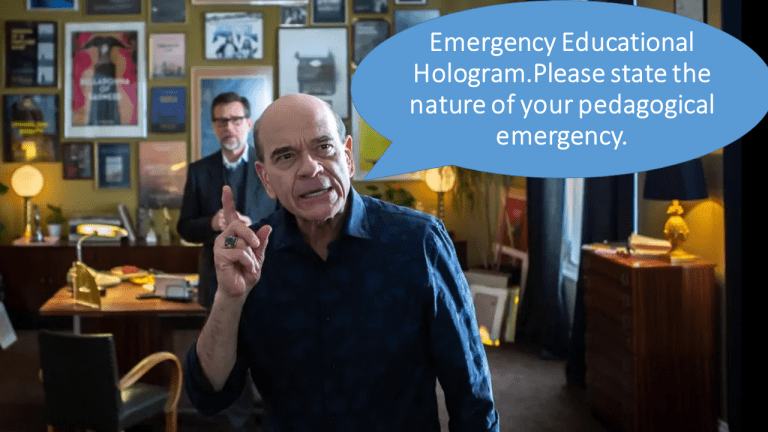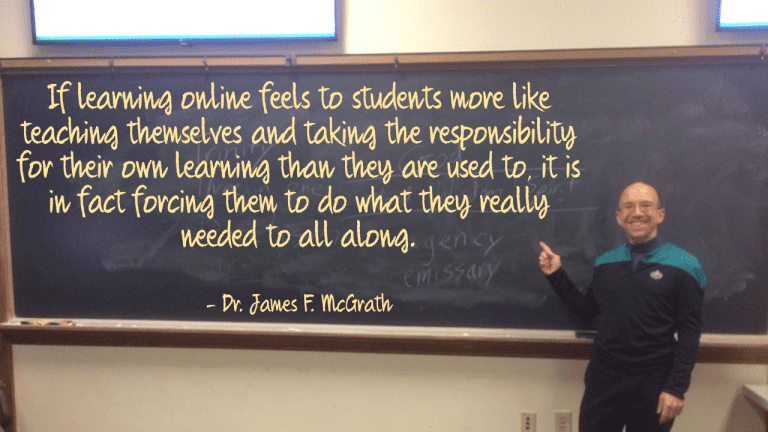I blogged recently about faculty transitioning courses online on short notice. For some faculty this will be particularly challenging as they have never taught online before. The first time is always hardest, and so those colleagues need even more support than they normally would shifting to online teaching, which is even then usually a significant investment of time and input.
In talking about this, I think many may forget that there are also large number of students for whom this will be their first experience of taking a course delivered online. Here are a few thoughts on that topic that professors may want to share with their students:
This will not be the first time they are learning online, although they may not have thought of it in those terms
We all learn online. Sometimes we learn useless trivia, or that YouTube comments are appalling. But we also learn useful information, at least if we ask the right questions and know how to find reliable information. I’ve not only found the contents of a book I needed to consult online, nor only lectures by amazing experts on topics of interest, but I’ve also learned how to make repairs to my home and equipment, how to play particular songs or styles of music on the piano or keyboard, and much else. I’ve asked questions on Facebook and received help from fellow academics. Students have learned online too, even if they haven’t taken a course online. We do so much online, that taking a course that way should be natural. If it doesn’t seem natural, then we need to ask ourselves why that is so, and whether the ways that we are separating the technologically-assisted ways that we are productive and learn in the rest of life from our formal educational experiences, in ways that may be detrimental. But however one answers that question, we are all online learners already, and that should help reassure us as we move additional parts of our learning and teaching online.
This is actually a hybrid course
A fully online course is online from start to finish. The semester began face to face (except for my students, because I was in Australia, but it became face to face as of the second week of the semester). And so there are already some advantages that fully online courses do not have. Students are already aware of and have gotten to know their fellow students in the course. Things have been explained and clarified in person. Questions have been answered. Expectations have been expressed. These things are often harder to convey through digitally-mediated means of communication. Going hybrid is often the best stepping stone to trying a fully online course. This is, really and not merely technically, the former rather than the latter. If even a hybrid course seems daunting to a student or a professor, let me add that just about every course is at least slightly hybrid in our time. Unless nothing is communicated by email, through multimedia content such as videos, or through a syllabus and readings on an LMS such as Canvas or Moodle, then the course is hybrid. In the current emergency situation, you’ll just be doing more of that, some of which you probably should have been doing before now. But beyond that, there is very little true learning when everything happens in the classroom. It is the reading and studying outside of class, the research, the practice, that is really crucial. Students who come to class having read nothing beforehand and leave to never give another thought to what happened in class will learn little if anything. All learning is hybrid, and we need to recognize this. This connects directly to my next point…
They should have been taking responsibility for their own learning all along
I think that in the process of messaging about the shift to online learning, we have the opportunity to say something crucially important for students in this situation, many of whom will be learning online for the first time, but it is something that applied beforehand to a greater extent than some of them realized or embraced. Learning is something that they do as students. University requirements give them goals and hold them accountable, and professors facilitate, clarify, and participate in the process of holding them accountable. But anyone with the desire and access to information can learn, and no one else can learn for them. If learning online feels to students more like teaching themselves and taking the responsibility for their own learning than they are used to, it is in fact forcing them to do what they really needed to all along. Butler University has a requirement to attend professional performances and lectures, to take advantage of educational opportunities outside the classroom. We’re discussing what to do about that under the circumstances. The goal there as well is to create a habit and expose students to resources. Ultimately they are the ones who will determine what they get out of it, and the only ones who can do so. That’s true of the entire college experience, and indeed of life in general.
As Mark Grabe recently wrote, “It is important to remember that learning is done by the learners. As an educator, you facilitate and support and for some practical reasons evaluate. Motivated learners with access to information (life experiences to analyze, books to read, videos to watch) and the willing to think about this information will learn. Educators can encourage thinking experiences in various ways to improve the odds, but to become overly concerned about what these experiences should or might be creates unnecessary anxiety. I am not saying what teachers do is irrelevant. Of course, we do important work. However, it is the work of the learner that is most important.”
Learning should be fun
Just because a subject we are studying is serious doesn’t mean we have to rob it of all the fun in how we approach it. We learn better when we enjoy ourselves. Encourage students to be creative in keeping spirits up. Here’s one possible way of doing that in an online course:
A protip for my fellow professors plunging into online education: Zoom lets you select a “virtual background.” I’m looking forward to lecturing at Hogwarts this Spring: pic.twitter.com/LQE93H9LLS
— William H. Grover (@wgrover) March 11, 2020
Be creative. Encourage students to do likewise. I’m glad that my gamified points-based (rather than percentile-based) approach to grading in the class that I am teaching has a certain flexibility built in. Students have been able all along to propose creative ways of demonstrating their learning. I’m eager to see what they come up with. I’m also looking forward to proposing new ideas for how they might work on their final collaborative projects. But even then I’ll remain open to suggestions about alternatives. Even when proposing a topic that one wants to be discussed seriously, it is possible to make the setting or some of the details lighthearted. Yes, there’s a risk that too much of that could encourage students to engage with the topic less seriously. But I still remember a final exam in philosophy of religion that I took as an undergraduate. One of the questions was something like this:
“If God knows I will pass this exam, the examiner cannot fail me.” Discuss.
That didn’t lead me to treat the subject lightly. I knew what the topic was this was seeking to get at. But it put my mind at rest. The person setting the exam and who would be grading it had a sense of humor. It was definitely helpful and reassuring in ways that led me to do better than I might have otherwise.
Crowdsourcing is essential
Faculty have been embracing this. Most of us knew it all along. Often we nonetheless set up assignments and activities that look for students to work on their own. Perhaps under the circumstances professors and other educators should embrace the fact that it is OK that we are smarter collectively than any of us is on our own. In the future, students will need to consult reliable sources of information and collaborate with others. This is an opportunity to hone those skills and abilities. But even when it is essential that they be asked to do their own “independent” work, they should support one another.
Online learning, just like online teaching, is not automated. It is the same human beings playing the same roles as in face to face classroom settings. In other words, we don’t have AI profs, nor AI students. Online learning just means using technology to communicate. If you cannot use email or a discussion board to convey what you could speaking face to face, then that just means you need to work on your written communication skills. That applies to professors and students alike. Whether we are having a small group discussion in a circle in a classroom or via Zoom, and whether we are reading a printed book or a pdf, we are learning from other human beings, as human beings.
Writing the above made it seem appropriate to make these:


We are whole people facing other challenges
Let me add a reminder of something we too often forget about our students (and they may not think about when it come to their professors) in regular classroom settings. We all have lives beyond the classroom and beyond the campus. The prospect of serious illness is distracting enough. Having to relocate or change plans will impact students more than faculty. Some will be burdened by added travel expense and job and income disruptions. Be kind and understanding towards one another.
Anything else that I should have added? Feel free to comment below, as part of this online and crowdsourced educational endeavor in this blog post, which is just one more example of the points I’ve been making if you think about it.
Here are a couple of additional resources:
Suddenly trying to teach a humanities course online
Coronavirus teaching guide from The Chronicle for Higher Education
Transforming Your Online Teaching from Crisis to Community
Bringing Your Course Online (MLA)
Resources for teaching music and audio production online
Resources from Oxford University Press
And of course see as well the ones I shared here previously:
Keep Calm and Teach On (Moving Your Course Online on Short Notice)
One more thing: a meme, in an effort to follow my own advice and make this post fun…














